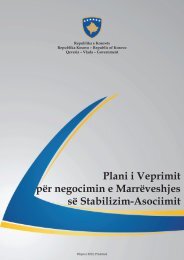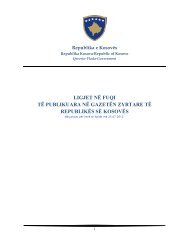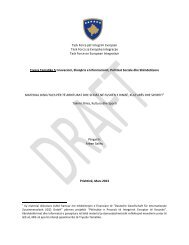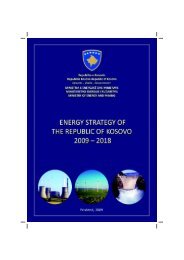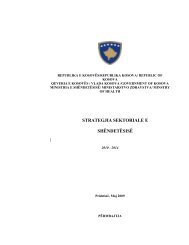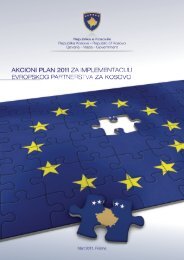Plenary 15 STM Conclusions
Plenary 15 STM Conclusions
Plenary 15 STM Conclusions
Create successful ePaper yourself
Turn your PDF publications into a flip-book with our unique Google optimized e-Paper software.
<strong>15</strong> TH MEETING OF THESTABILISATION AND ASSOCIATION PROCESS TRACKING MECHANISMCONCLUSIONSPRISTINA, 2 DECEMBER 2008The <strong>15</strong> th meeting of the Stabilisation and Association Process Tracking Mechanism was held inPristina on 2 December 2008.The meeting was attended by the Kosovo government, the EU Special Representative, the FrenchAmbassador for the EU Presidency, UNMIK, the European Commission (including the EuropeanCommission Liaison Office in Pristina) and by EU Member States represented in Pristina (a detailedlist of participants is attached in attachment 1).The meeting was opened by Prime Minister Hashim Thaçi and Pierre Mirel, Director for the WesternBalkans at the Directorate-General Enlargement of the European Commission together with EUSRPieter Feith and French Ambassador Delphine Borione for the EU Presidency. In his openingstatement, Prime Minister Hashim Thaçi welcomed the European Commission’s recently-publishedProgress Report, which he characterised as realistic and identifying the challenges of Kosovo’s newlydeclaredindependence. The Government of Kosovo appreciates its dialogue with the Commission,given the importance of Kosovo’s European agenda, and therefore the launch of a feasibility study onhow to develop this agenda. PM Thaçi also reiterated his commitment to good neighbourly relations,as well as defending human and minority rights as laid out in Kosovo’s constitution.Mr Pieter Feith, EUSR in Kosovo highlighted that this was the first direct <strong>STM</strong> meeting between theEuropean Commission and the Kosovo authorities. This dialogue is likely to be deepened by theCouncil when this proposes ways to develop relations to Kosovo. For the EU Presidency, FrenchAmbassador Delphine Borione stressed that promoting the region’s European perspective has been apriority of the French Presidency.Co-Chair Pierre Mirel stressed that Commission’s commitments to Kosovo were strong and concrete:the Commission’s tools for Kosovo are the same as those for all other candidates and potentialcandidates: European Partnership, Progress Report, Instrument for Pre-Accession (IPA). With the July11 th Donors Conference, the Commission has gone even further. Mr Mirel noted that the publication ofthis year’s Progress Report saw a welcome wide-ranging debate in Kosovo. The Commission will beproposing a feasibility study to examine how Kosovo can progress further alongside the rest of theregion in the context of the stabilisation and association process. For this, the Commission needs astrong partner in Kosovo and firm commitment from the Government.I. European Commission Annual Regular ReportSummarising the 2008 Annual Progress Report, Mr Mirel reminded that, according to the exercisemethodology, the report takes account of information from many sources. It only mentions measuresactually adopted over the past 12 months. Perhaps the most important issue is public administrationreform, which is vital to ensure delivery of public services and reform. Kosovo has begun this process,but has a long way to go. Reform of the judiciary is also important, as is the fight against organisedcrime and corruption. Nevertheless, the government should not rush proposals through the parliament,there should be a discussion on the impact of measures and consultations with stakeholders, as well asthe EULEX mission. In the area of human rights or the rights of minorities, the Commission called onstronger determination and effective implementation of existing laws.The Commission stressed that it is important that Kosovo continues to participate in regional fora andco-operation activities. The Government should develop guidelines and practical modalities that allowKosovo’s participation.As regards the economic criteria, Kosovo has made little progress in developing a functioning marketeconomy. In European Standards, overall compatibility with EU norms is at an early stage.
<strong>15</strong> th <strong>Plenary</strong> <strong>STM</strong> Meeting <strong>Conclusions</strong>Mr Mirel stressed that the Commission was preparing the Terms of Reference for the feasibility study,to examine the means to deepen Kosovo’s European integration. For this, the Commission called onKosovo’s help, as the study will be a joint exercise.II. Update on the Agency for the Co-ordination of Development and European IntegrationThe Kosovo authorities explained the logic behind the establishment of the Agency for the Coordinationof Development and European Integration. By merging its Donor Co-ordination andEuropean Integration agendas and structures from October 8 th , the government intends to co-ordinatepositions at the highest level.The new Agency is an addition to other co-ordination mechanisms, such as the Inter-ministerialCommittee for European Integration and the Working Commission for European Integration, as intergovernmentalstructures, and the Assembly Committee for European Integration.The structure of the Agency for the Co-ordination of Development and European Integration has beenadopted by the government, and appointment procedures have been launched, including that of theAgency’s CEO. The aim is to ensure that the Agency is fully operational by January, when work willbegin to review both the Mid-Term Expenditure Framework (MTEF) and the European PartnershipAction Plan (EPAP). A first meeting with donors of the Donor Co-ordination mechanism, as a followupto the July 11 Donors Conference, is planned for March. However, it was pointed out that theAgency has difficulty retaining qualified staff.The Commission welcomed the establishment of the Agency, as a response to commitments made atthe Donors Conference, and pointed out that, in the experience of the 5 th enlargement, it is importantthat candidates set up strong and effective structures for European Integration and assistance coordination.As the member of the Government responsible for the agency, the Commission called onthe Deputy Prime Minister to ensure that this agency becomes Kosovo’s gateway to the EU. TheCommission also highlighted that the new structure has to have sectoral responsibilities for both policyand assistance matters, as well as following up on EPAP commitments. The EU will continue toprovide assistance to the Agency, and has received considerable interest in a forthcoming twinningproject for the agency.Follow-up9 Kosovo authorities to finalise the structure of the Agency and appointment of personnel, includingthe CEO, as well as senior programming officers in line ministries (by end of January 2009).9 Agency to organise the March meeting with donors9 Agency to consult with the Commission on the revision of the MTEF and EPAPIII. Political criteriaPublic Administration ReformThe Commission summarised the key challenges as firstly adopting the Civil Service Law, secondlyensuring that the Kosovo Institute for Public Administration (KIPA) becomes a key vector for PublicAdministration Reform, thirdly, finalise the (ongoing) functional review of pubic administration.It is important that the public administration finds its right size. This could mean reducing staff insome areas and increasing it in others. Such an approach could free up resources to provide targetedsalary increases, where these are accompanied by sectoral reform.The Kosovo government presented its priority objectives in this area as creating a modern, efficientand apolitical administration. The government is creating a ‘Brain Drain’ fund of €1 Mio, tosupplement salaries for civil servants who are essential for Kosovo's EU Integration process.However, Kosovo’s administration is young. It is looking at models in other EU Member States.- 2 -
<strong>15</strong> th <strong>Plenary</strong> <strong>STM</strong> Meeting <strong>Conclusions</strong>There are plans to establish a fully e-government administration by 20<strong>15</strong> and to adapt to new workingmethods. The functional review of the public administration is now complete in some ministries. Thiswill continue to cover all the government departments, although the first findings will be publishedalready to allow the first reforms to begin (particularly eliminating unnecessary departments).Concrete measures can be expected in 2009.A number of ‘organic laws’ on public administration, to replace the corresponding UNMIKlegislation, are being finalised. These include the Civil Service Law (to guarantee independence and toestablish the structures), the Law on E-Government, and the Law on Civil Servants’ Pay. Kosovo isalso establishing a cadastral office and is working to improve the statistical office (in preparation for acensus). A building for the Constitutional Court has been identified, pending adoption of the law onthe Constitutional Court.The Commission highlighted the importance in the public administration of accountability as aconsequence of funding: an administration which receives public money should deliver results and beaccountable to the budgetary authorities. The role of the statistical system was also stressed, not onlyfor the forthcoming census: Kosovo needs to deliver statistics for citizens and policy-makers. The EUcan help the Statistical Office of Kosovo (SOK), but the Commission stressed that SOK needs toreceive political support.Follow-up9 The 3 organic laws (Civil Service Law, Government, Civil Servants’ Pay) to be adopted ( Q12009)9 The functional review of public administration is also to be finalised (Q1 2009 ).Comment [v1]: This should be law onGovernment not Law on e-government as it was sofar in the conclusionsComment [FW2]: OkThe fight against corruptionCreating an administration free of corruption is the highest government priority. To this end, theGovernment needs to improve accountability as well as to enhance co-ordination between the 3branches of government. Kosovo is adapting the anti-corruption law. There is an inter-ministerial anticorruptiongroup to fight corruption within the Government, and an anti-corruption agency will do thisoutside the Government. This agency has presented a strategy 2009-2011, which is to be adopted bythe Assembly (in January or February 2009) and will be followed by an action plan. The anticorruptionagency is also discussing with each municipality. Laws on the control of assets andamendments to the law against corruption should be completed at the latest Q1 2009. The Commissionpointed out that remarks made in the Progress Report on corruption are not specific to Kosovo, theyare common to all the region. Fighting corruption is important for the EU, it is particularly importantfor the citizens, who expect their government to be honest. Corruption is an obstacle to investment, thejudiciary and can undermine reforms in other areas.Follow-up9 Laws on the control of assets and amending the law against corruption should be completed (at thelatest Q1 2009).9 The new anti-corruption strategy is to be adopted by the Assembly (January or February 2009) andshould be followed by an action plan.Human and minority rightsThe Commission pointed out that there are several agencies and bodies in the area of human rights,gender equality, communities, and inviting the government to improve consultation and co-ordinationbetween them. A functional review is needed to streamline the institutional framework and avoidduplicating responsibilities. The Commission also invited the Government to produce a Roma strategyand, as an urgent priority, to relocate persons living in lead-contaminated camps. Finally, it called onthe government to protect cultural heritage sites and carry out investigations into incidents. As regards- 3 -
<strong>15</strong> th <strong>Plenary</strong> <strong>STM</strong> Meeting <strong>Conclusions</strong>displaced persons and refugees, the Commission called on the Government to accelerate the process ofreturns. The Government replied that more resources and enhanced coordination were needed toaccelerate this process.The government stated that it established a municipal mechanism to monitor the implementation ofhuman rights legislation by municipalities. Kosovo is currently strengthening its administrativecapacities to monitor better human rights enforcement and increase cooperation among the relevantinstitutions. The Strategy and Action Plan for Human Rights in the Republic of Kosovo 2009-2011 isbeing drafted in coordination with the Office of the Prime Minister of the Government of Kosovo /Office for Good Governance. It is being drafted in close cooperation with many relevant actors in thefield of Human Rights in Kosovo and with international institutions involved in the field. The Roma,Ashkali and Egyptian (RAE) strategy should be approved in December 2008 and this will be followedby strategies for the disabled, and child rights.In the domain of gender equality, the government is finalising the report on CEDAW Convention(Committee on the Elimination of All Forms of Discrimination against Women) that will be presentedto the UN. A strategy against domestic violence is also being drafted. The Gender Equality Agency isto recruit an additional 7 persons according to the Kosovo draft Budget 2009. Each municipality willbe asked to create an office of gender equality. A Gender Research Centre is to be set up. The OPMhas established a commission that is in the process of reviewing the Administrative Instruction 2007/4on the establishment of the human rights units with the aim to clarify overlapping responsibilitiesbetween AGE and OGG.To ensure the protection of cultural heritage sites, the government has identified actions to protectorthodox churches, including (where necessary) hiring private companies. Prosecutions of those whoattack these sites are ongoing, although not always at a satisfactory pace. The government is alsostepping up educating people on the values of cultural heritage. A law on special protective zones hasbeen adopted and a working group has been created to facilitate its implementation. Two more lawsshould be adopted by end 2008 regarding the protection of Prizren and Velika Hoca. The governmentgave a firm commitment to find a solution for the informal settlements and relocate persons living inlead-contaminated camps (before 2012). The government stated it would rapidly contact the leaders ofthese camps. As regards the return process, the government recalled the active role played by themunicipalities and the will to further the cooperation between MLGA and MCR. The Government iscompletely committed to its policies of returns of all displaced and is working with donors to step upthis process as well as improving the sustainability of the return process (revising the manual onsustainable return).In the Community rights domain, the government stated that respective responsibilities of the threerelevant bodies will be clarified. Their coordination will be ensured, including for budgeting.Follow-up9 Reviewing the legislation in the field of Human Rights and finalising the strategy and Action Planfor Human Rights (December 2008).9 Approve the RAE strategy (December 2008).9 Adopt the strategy for people with disabilities ( Q2 2009).9 Adopt the strategy on children rights during (Q2 2009).9 Approve the strategy against domestic violence by the Government (Q2 2009)9 Recruit an additional 7 persons to the Gender Equality Agency (Q4 2008)9 Oversee the creation of offices of gender equality in each municipality. (No date)9 Review of and subsequent decision on the Administrative Instruction 2007/4 on AGE (Q1 2009)9 Establish a plan and timetable to relocate persons living in lead-contaminated camps (no date).9 Draft a revised manual on returns (Q1 2009)Formatted: Not Highlight- 4 -
<strong>15</strong> th <strong>Plenary</strong> <strong>STM</strong> Meeting <strong>Conclusions</strong>9 Provide further information on the division of labour between bodies dealing with communitiesand returns in the next days. Adoption of two new laws on the protection of Prizren and VelikaHoca (by end 2009).Property rightsThe Government stated that there have been many property claims in Kosovo. The Kosovo PropertyAgency (KPA) is responsible for resolving private, agriculture and commercial property claims in theperiod before 1999. Whilst this should have been finalised by the end of 2007, it has had to deal withover 39,000 claims (of which 35,000 for land). So far the KPA has dealt with 16,000 claims and hopesto reach 19,000 by the end of the year. Kosovo has also started implementing these claims. Some ofthese will go to the courts and will have to be executed with the help of EULEX.The Commission called upon a speedy settlement of claims and finalising the procedure to calculateand provide compensation for successful property claims.Rule of Law / JudiciaryThe Government stressed that 11 laws resulting from the Comprehensive Status Settlement packagehave been adopted and there have been improvements to the correctional services, including buildinginfrastructure. However, Kosovo also needs a high security prison and intends to improve thefunctioning of the prisons system, particularly for juveniles.Regarding juvenile justice, the government informed about the agreement between the MoJ and MESTto organise classes by public schools' teachers in special rooms enabling the prisoners to receiverecognised certificates.Kosovo intends to conclude laws on the Constitutional Court, Judicial Council, illegally obtainedassets. This will launch the judicial reform to ensure coherence with the European judiciary to reachfull independence of the judiciary.With the entry into force of the constitution, Kosovo needs to harmonise legislation with theconstitution. The Government is also finalising the laws on anti-corruption, conflicts of interest,autopsy, execution of sentences, declaration of assets, and will establish a forensics department.The ombudsperson should be appointed before the end of the year by the Assembly.The Commission pointed out the link between all of these laws and the EU’s €25 million IPA packagein this area, which includes helping build the new Palace of Justice, for which a suitable location stillneeds to be found, as the proposed one was unsatisfactory.Follow-up9 Conclude laws on the Constitutional Court, Judicial Council, and illegally obtained assets (Q32009).9 Launch judicial reform to ensure coherence with the European judiciary ( based on the work plansof MoJ and Kosovo Judicial Council, this should be completed by Q4 2012).9 Adopt the Law on Amending the Law on Prevention of Conflicts of Interest (end June 2009)9 Adopt the Law on Autopsy (Q1 2009)9 Adopt the Law on Amending the Law on Penal Sanctions (end April 2009)9 Government to use its weight to convince the Assembly to appoint the ombudsperson (before theend of 2008)9 Clarify the seat of the High Security Prison within a very short period.Regional Integration Initiatives- 5 -
<strong>15</strong> th <strong>Plenary</strong> <strong>STM</strong> Meeting <strong>Conclusions</strong>Kosovo has difficulty participating in regional integration initiatives and fora, and needs to defineguidelines, with the help of the ECLO, to ensure this participation.Follow-up9 Establish guidelines to ensure Kosovo’s participation in regional integration initiatives (January2009)IV Economic criteriaExistence of a functioning market economyThe Government will provide a response to the Commission’s proposed Fiscal SurveillanceMechanism, having discussed the mechanism with the International Monetary Fund (IMF).Kosovo’s growth forecast for 2009 is +6% growth, driven by private sector development Such figuresassist in the precise execution of the budget; the level of expenditures until now is double that of theentire year of 2007, and this increase in expenditure has been carried out with the same number ofpersonnel.The 2009 budget is currently in its first reading in the Assembly, including a discussion with allpolitical parties. The second reading is due before the end of the year. The government is trying toimprove harmonisation between the MTEF and EPAP.Kosovo has established privatisation committees for the 3 Publicly Owned Enterprises (KEK, PristinaInternational Airport and PTK, the telephone operator). By the end of the year an administrativeinstruction on staffing the boards of POEs will be drafted, and these boards will be appointed.Kosovo intends to begin the full housing and population census in Q2 2009.A new law on tax was adopted recently, which foresees the creation of a new investigative unit tocombat fiscal evasion. Individual tax rates are determined by separate laws. In Q4 2009 Kosovo plansto start issuing fiscal numbers and to develop supporting tax IT systems.Despite defects in the legal framework on public procurement, Kosovo has achieved a high rate ofexecution. In September 2008 the Procurement Review Board was established. The PublicProcurement legal framework is to be reviewed in December to introduce flexibility as well asimproving quality.The law on State Aid is to be adopted before the end of 2009. An internal audit manual is to bepublished at the beginning of 2009 and licensing of auditors defined shortly afterwards.Problems in the legislation of the Special Chamber of the Supreme Court have been an obstacle for theprocess of liquidating State-Owned Companies (SOEs). Redrafting the law is being finalised, it ishoped this can be completed in the first quarter of 2009.The Commission regretted that there is still a significant backlog in the privatisation of SOEs. It alsohighlighted the importance of the governance of the Public-Owned Enterprises (POEs) and nominationto key posts in their boards (as well as to the boards of regulatory bodies). The forthcoming censusneeds to be co-ordinated with the International Civilian Representative (ICR) to ensure that theexercise covers the entire territory of Kosovo.The Commission also expressed its concern at the way that the 2009 budget was being prepared.These concerns were shared with a number of Kosovo’s partners (ICO, IMF). Salary increases need tobe accompanied by sectoral reforms. Finally the Commission pointed out that a considerableinvestment in a budget development management system was being jeopardised by the lack ofqualified personnel attributed.Follow-up- 6 -
<strong>15</strong> th <strong>Plenary</strong> <strong>STM</strong> Meeting <strong>Conclusions</strong>Kosovo is implementing the law on teachers’ salaries but is also re-qualifying 20,000 teachers. Thosethat fail the certification process are encouraged to return to university and take up teacher trainingstudies. In parallel, Kosovo is developing teacher training curricula.Social affairsKosovo’s unemployment levels are high, and the cost of the present legislation is not affordable forKosovo. A white paper on social affairs is being drafted by an inter-ministerial committee, it is hopedto finish this by January 2009, in order to target social support on those that really need it whilstbearing in mind the need for fiscal prudence and limited budget resources. At the same time, Kosovois trying to engage with partners to develop opportunities in the European labour market.The Commission stated the white paper should be complemented by an implementation strategy toreassure donors on the usefulness of assistance to that sector. Also accompanying measures should bedeveloped such as the establishment of employment agencies in the municipalities.Agriculture and rural developmentThe Food Law is currently in its second reading in the Assembly. The law foresees the establishmentof a single Food and Veterinary Agency and integrating the Phytosanitary border management. TheAgriculture and Rural Development Law is also being revised. This will create a payment agency,which will start by distributing Kosovo Consolidated Budget (KCB) funds. The Agriculture and RuralDevelopment Plan is also being revised.Kosovo is also preparing a strategy to upgrade agri-food establishments, and will begin by establishingan inter-ministerial working group on this.EnergyRaising the level of billing and collection is a real challenge. The power utility (KEK) has created anew organisation structure per district to improve billing and collection, is installing meters at substationsand is increasing disconnection of bad payers. The net result is an increase of 12% inpayment, 25% in supply and 2% in technical loss. Power tariffs increased in 2008.KEK’s unbundling was completed in September. KEK has to carry out, without any delay, theprocurement procedures for key mining facilities needed in order to open the Southwest Sibovc mineas soon as possible. Until the new mine opens, KEK is stockpiling lignite. KEK intends to use thisuntil the new mine is opened. Next year Kosovo will tender hydropower plants and is acceptingproposals for wind energy. However, disagreements with Serbia hamper the system’s operation.The Law on natural gas has been approved in first reading at the Assembly and currently is beingconsidered by the respective Assembly Committee, while the law on energy efficiency is beingdrafted. However, there are problems with Serbia for transmission networks. Tariffs have increasedthis year.EnvironmentThere is considerable environmental legislation in the pipeline for adoption next year, and this will befollowed by implementing legislation. The law on ionising / non-ionising radiation is in secondreading in the Assembly.Kosovo is implementing its environmental action plan. However, lack of funds is a problem. Kosovois also trying to gain membership of international organisations and protocols (including Kyoto).Justice, freedom and securityKosovo has drafted and carried out the review supplementing the strategy for Integrated BorderManagement and is finalising the plan for implementing this strategy. The Ministry of Internal Affairs- 8 -
<strong>15</strong> th <strong>Plenary</strong> <strong>STM</strong> Meeting <strong>Conclusions</strong>has signed a Cooperation Agreement with the Ministry of Internal Affairs of Albania, which containsan important inter-border cooperation element. It is also drawing up a strategy (with EULEX) to fightorganised crime. For the moment, Kosovo has consolidated the government’s action in the fightagainst people trafficking. The government has started to work on a strategy to combat drugs and forthe fight against terrorism. The government expects to draft action plans once the strategies areadopted. There is also a strategy on the informal economy and money laundering. A draft law onmoney laundering is ready and the Commission asked for its copy.There are questions as to where the FIC (Financial Investigation Centre) should be located, given theinvolvement of the international community. The Commission recommended that the governmentdiscusses with EULEX as to where the FIC be situated.Follow-up9 Adopt law on the internal market (Q3 2009). Implement the law on accreditation, includingensuring that the Accreditation Agency is operational (Q2 2009)9 Review the law on consumer protection (Q1 2009)9 Finalise establishment of the Competition Commission (Q4 2009).9 Adopt regulations on metrology and quality assurance (Q4 2009)9 Adopt the multi-modal transport strategy (June 2009)9 Finalise the establishment of the Independent Rail Regulatory Authority (June 2009) and nominatethe members of the IRRA board (end 2008)9 Appoint the Civil Aviation Authority board (end 2008)9 Finalise the white paper on social affairs (in consultation with international partners) (January2009)9 Adopt the Food Law (Q1 2009) and establish a single Food and Veterinary Agency (integratingPhytosanitary border management) (Q2 2009)9 Revise the Agriculture and Rural Development law (Q1 2009).9 Revise the Agriculture and Rural Development Plan, focusing on a limited number of priorities(Q2 2009)9 Prepare a strategy to upgrade agri-food establishments (Q4 2009).9 Adopt the Law on Natural Gas (Q4 2008)9 Adopt the Law on Energy Efficiency consult the Commission on conformity. (Still no date)9 Set targets for improvements to billing and collection rates (Q4 2009).9 Adopt law on Nature Protection (Q4 2009)9 Adopt Law on Protection from Ionising and Non-Ionising Radiation (Q2 2009)9 Adopt amendments to the law on Environmental Impact Assessment and the law on StrategicImpact Assessment (Q1 2009).9 Adopt Law on Integrated Prevention and Pollution Control (Q2 2009)9 Develop curricula for RAE students, including for Roma language (by end 2009).9 Adopt the law on money laundering (Q2 2009)9 Adopt law on management of confiscated assets (Q3 2009)9 Establish agency for management of confiscated assets (Q1 2010)9 Endorse the strategy against narcotics (Q2 2009)9 Endorse the strategy for the fight against organized crime (Q2 2009)Formatted: Not Highlight- 9 -
<strong>15</strong> th <strong>Plenary</strong> <strong>STM</strong> Meeting <strong>Conclusions</strong>9 Endorse the strategy against terrorism (Q2 2009)9 Publish the Plan for the implementation of the Strategy on Integrated Border Management (Q12009)9 Establishment of the Executive Board for the Integrated Border Management (Q2 2009)9 Signing of Memorandum of Understanding with the former Yugoslav Republic of Macedonia andthe Republic of Montenegro (Q2 2009)VI.Any other businessThe minutes of the following sectoral meetings were adopted- <strong>STM</strong> on Internal Market (14.04.2008)- <strong>STM</strong> on Innovation (24.-25.04.2008)- 14 th <strong>Plenary</strong> <strong>STM</strong> (29.05.2008)- <strong>STM</strong> on Good Governance (02.-03.06.2008)- <strong>STM</strong> on Economy (17.06.2008)- <strong>STM</strong> on Infrastructure (25/26.09.2008)- <strong>STM</strong> on Agriculture (27/28.10.2008)The next plenary <strong>STM</strong> meeting will take place in the first half of 2009. In the coming weeks, acalendar for sectoral <strong>STM</strong> meetings will be proposed.The Commission thanked the Kosovan authorities for their hospitality in hosting this meeting, and theprofessionalism with which the meeting was organised.- 10 -
<strong>15</strong> th <strong>Plenary</strong> <strong>STM</strong> Meeting <strong>Conclusions</strong>−−−−−−−−−−−−−−−−Mr. Florian Dushi, Acting Permanent Secretary MoJMr. Bashkim Isufi, Acting Permanent Secretary MFEZnj./g-đa/Mrs. Resmije Mumxhiu, Acting Permanent Secretary MEMMr. Shkelzen Syla, Permanent Secretary MSFMr. Zana Kotorri, Acting Permanent Secretary MRCMr. Salih Morina, Permanent Secretary MCYSMr. Ismail Rudari, Acting Permanent Secretary MESPMr. Bardhyl Jashari, Acting Permanent Secretary MIAMr. Fitim Gllareva, Acting Permanent Secretary MFAMr. Eshref Shabani, Permanent Secretary MLSWMr. Afrim Sylejmani, Acting Permanent Secretary MoHMr. Fitim Sadiku, Acting Permanent Secretary MPSMr. Ibrahim Krasniqi, Permanent Secretary MTIMr. Skender Gashi, Permanent Secretary MTTMr. Ismet Krasniqi, Kosovo Assembly SecretaryVarious EI Advisors, Assembly Committee for EI and EI Focal Points in ministries2. European Commission:− Mr Pierre MIREL, Director for Western Balkans, DG Enlargement− Ms Genoveva RUIZ CALAVERA, Head of Kosovo Unit, DG Enlargement− Mr Nicolas CENDROWICZ, Kosovo Unit, DG Enlargement− Mr Stefano DOTTO, Kosovo Unit, DG Enlargement− Mr Arnaud APPRIOU, Kosovo Unit, DG Enlargement− Mr Viktor BOJKOV, Kosovo Unit, DG Enlargement− Mr. Lukas HOLUB, Kosovo Unit, DG Enlargement− Ms Isabelle TROCH, Kosovo Unit, DG Enlargement− Ms. Magdalena MUELLER-URI, Kosovo Unit, DG Enlargement− Mr Renzo DAVIDDI, Head of European Commission Liaison Office in Pristina− Mr Khaldoun SINNO, Head of Political, Economic and European Integration Section, ECLO− Mr Kjartan BJORNSSON, Head of Operations, ECLO− Mr Freek JANMAAT, ECLO− Ms Friederike WUENSCHMANN, ECLO− Mr Emmanuel COHEN-HADRIA, ECLO− Ms Iva STAMENOVA, ECLO− Mr Gazmend SELIMI, ECLO− Ms Merita GOVORI, ECLO− Ms Besime KAJTAZI, ECLO− Mr Wolfgang KOETH, ECLO− Ms Carole POULLAOUEC, ECLO− Ms Lendiata GASHI, ECLO− Ms Emilia GARGALLO GONZALEZ, ECLO3. EUSR/ ICO− Mr Pieter Feith, EU Special Representative in Kosovo and ICR− Mr Severin STROHAL, ICO− Ms Maria FIHL, ICO− Mr Ruediger LOTZ, ICO4. EU Presidency:− Ms Delphine BORIONE, French Embassy- 12 -
<strong>15</strong> th <strong>Plenary</strong> <strong>STM</strong> Meeting <strong>Conclusions</strong>5. UNMIK:− Mr Kris Pierre Litiere, Special Adviser to the Special Representative of the Secretary General6. EU Member States:− Mr Gernot PFANDLER, Austrian Embassy− Mr Wim PEETERS, Belgian Office− Mr Andy SPARKES, British Embassy− Mr Ivo Ivanov, Bulgarian Office− Mr Jan PLESINGER, Czech Office− Ms Janina HREBICKOVA, Czech Republic Embassy− Ms Kristiina HAIKIO, Finish Office− Mr Eckart Blaurock, German Embassy− Mr Dimitris A.MOSCHOPOULOS, Greek Office− Mr Zoltan IMECZ, Hungarian Office− Mr Michael GIFFONI, Italian Embassy− Mr Pierre WEBER, Luxembourg Office− Mr Henk VOSKAMP, Netherlands Embassy or Carel BRANDS Deputy− Mr Gheorghe BUCURA, Romanian Office− Mr Miloslav NAD, Slovakian Office− Mr Vojko VOLK, Slovenian Embassy− Ms Ingrid JOHANSSON, Swedish Office7. EULEX− Alessandro Rotta, Political Advisor8. OSCE− Joseph BRINKER− Christopher DECKER− Wilma THEUWS- 13 -


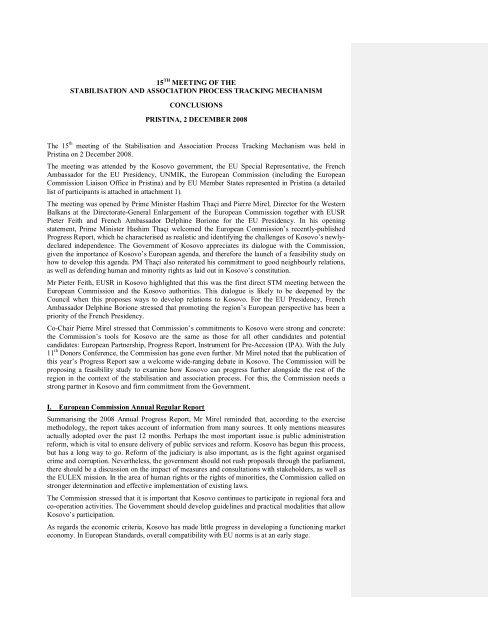
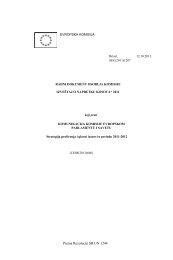
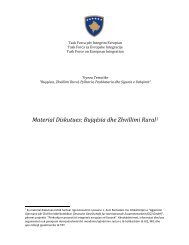
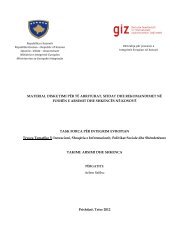
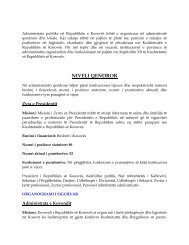
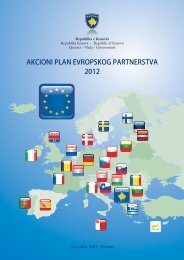
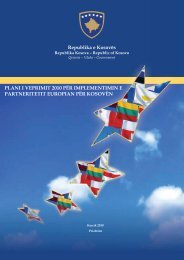

![Akcioni plan za implementaciju evropskog partnerstva 2010 [ srb ]](https://img.yumpu.com/46443658/1/190x245/akcioni-plan-za-implementaciju-evropskog-partnerstva-2010-srb-.jpg?quality=85)
